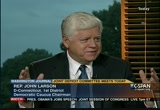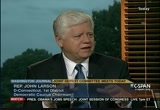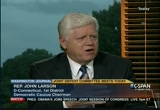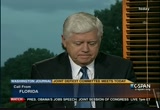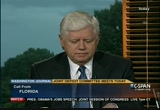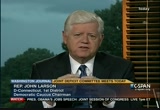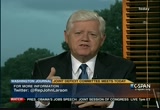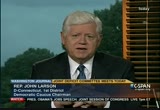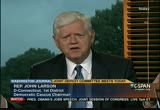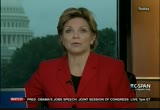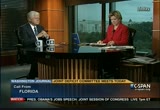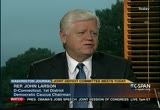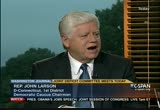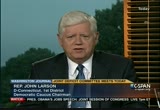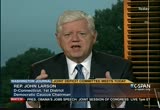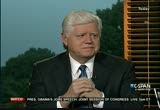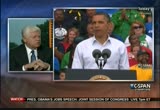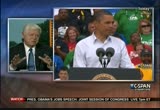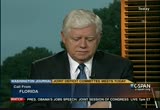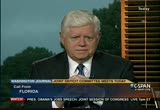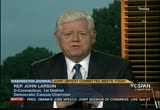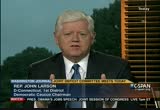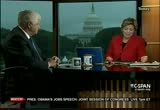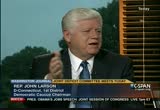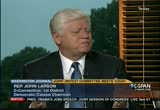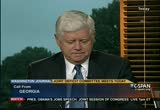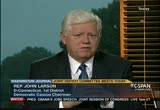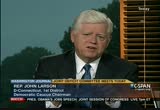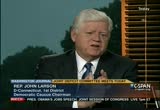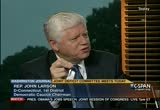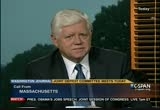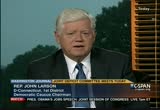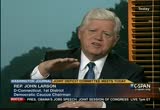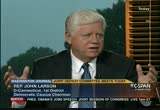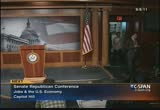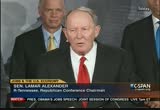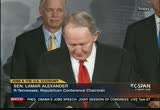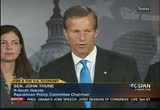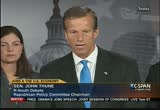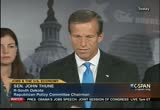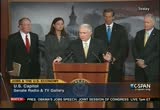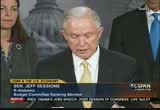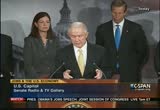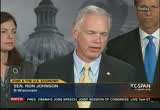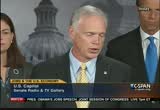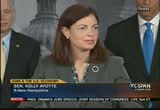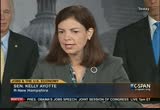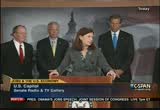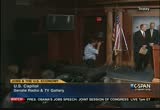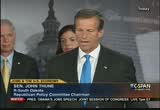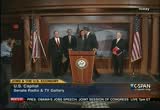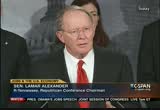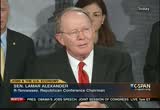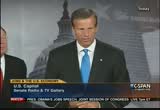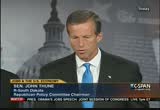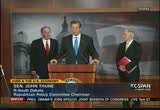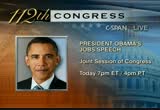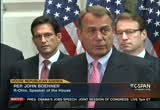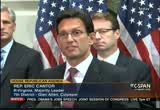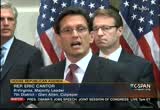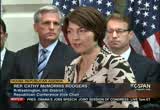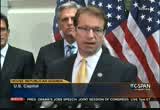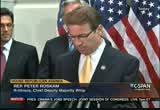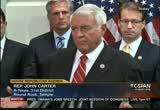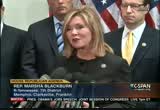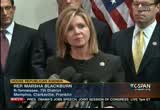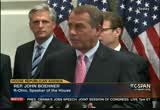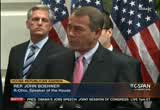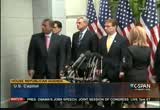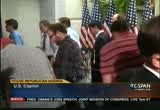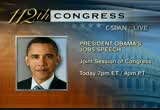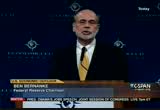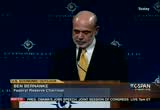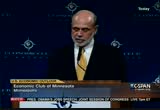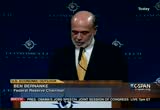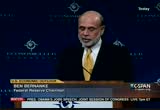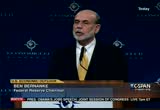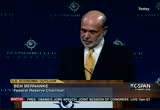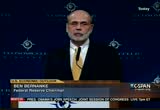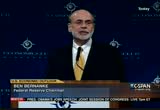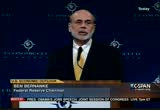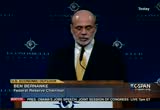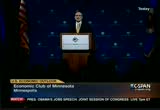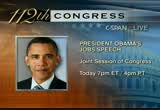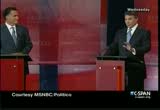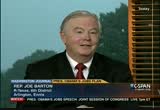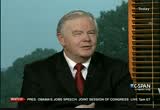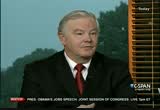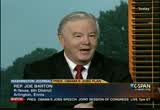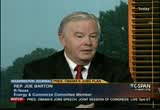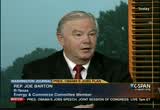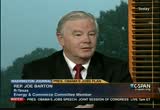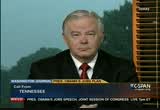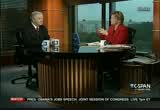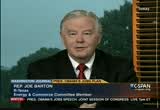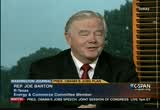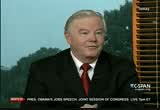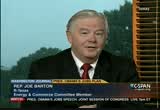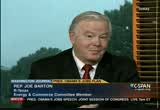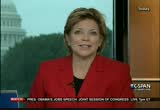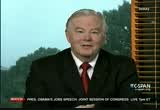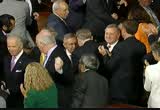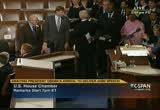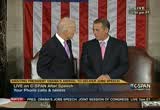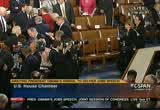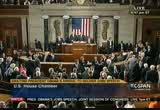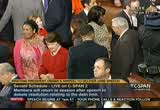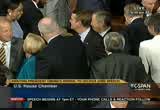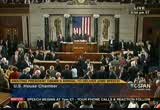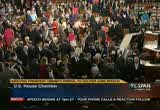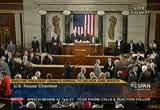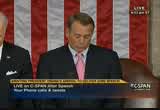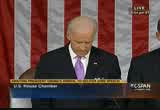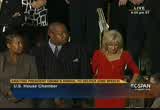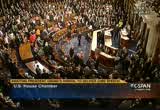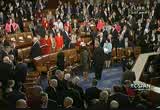tv U.S. House of Representatives CSPAN September 8, 2011 5:00pm-7:00pm EDT
5:00 pm
tweets. here's one. callerwhat's your reaction? guest: a very positive statement. good people can disagree, but we need to move this nation for. i think eric cantor and myself and others when they went home heard very clearly from the public, stop the bickering in both houses and get the job done. job number one, put america back to work. that is what i think my proposal that i talked about before and when i say my proposal, i believe the committee will adopt something. it does not have to be my proposal, but if what we need and what this committee provides, and it will be the focus of this fall session, is a time frame.
5:01 pm
this committee has that. it is a very short timeframe. we only have 40 legislative days and the committee on has 100 days in which to complete their task. all committees must submit to the super committee by october 14 their plans and ideas. it would be great to see every committee submitting a plan for deficit reduction and job creation and economic growth, knowing that the two are linked. and then having till november 23 to present plans to congress. if congress will continue in a bipartisan manner, then there would be triggered an automatic deal where the cuts going to affect across-the-board and the jobs plan would be voted on up or down. either way, the american people would be served. if we work together, not only would it be good in our country, but we would once again establish ourselves as the preeminent parliamentary body
5:02 pm
around the globe and demonstrate that in a democracy that is free and open, people can disagree, but we can govern. i think that is what is at stake here. host: there's a map that looks at state-by-state unemployment. let's focus on your home state. conn. tell us what the situation is there. guest: the situation is starting to improve under the governor who just went through very difficult session. in my own district, to see levels of unemployment in our urban areas rise to 20% is unacceptable. and so, that is why we think it is so important to come up with a program of work that will put people back to work. it's better that people are working as opposed to collecting an unemployment check. i would much rather make sure that the government money is going towards people getting significant and meaningful training and have them be
5:03 pm
involved in this case, as we suggested earlier, in the recovery and aftermath of storms and the ongoing conservation that had been neglected for so many years, and so much work out there for people to do. , host: osman, let's get some of your questions and comments. we begin with jeff from sarasota, florida. you are on. caller: good morning. i have a couple comments. i hope you'll bear with me. my first comment, i think the job training idea has a good idea. only problem is if you are talking about trying to have the job training impact that the restoration restoration of coastal areas, i don't see how the time line would meet up with that. second, the infrastructure projects has to be there to actually be done.
5:04 pm
the timetable has to work itself out to the end where the process is ready to be worked out and all the permitting is done. if you just throw money at states again, personally, when i vote and governor in my state and house members, i expect them to balance our budget and deal with pension and things of this nature. i don't think you guys need to throw more money at the states to help them deal with these things. last, i agree that my party, the republican party, needs to work with you guys on jobs. we are in a bad climate right now. the one thing that does not help us, while a lot of your fellow party members are out there spending are medicare and medicaid and social security and saying the programs are solvent and if we just raise taxes on people, everything will be fine. that's not true. these problems statistically don't work out if you do the math. i don't see how we can work together when you guys are
5:05 pm
5:06 pm
guest: we heard from our members last evening. that needsot of work to be done. we do not need to create a bureaucracy. i think as recline -- ezra klein from "the washington post" has it about right. it simply was not enough. so rather than taking it to it's full extent and letting the antibiotic go on its course, we gave too little antibiotic in
5:07 pm
the case of infrastructure. the states and municipalities wanted the aid at the time and they needed that. many states took money that was intended for a shovel-ready projects and used it to balance their budgets. 1/3 of that money went to tax cuts, which most people do not recognize that they receive. there is still room for an infrastructure program and there is growing concern in congress as people go home and his people lived through some of these storms and seeing what the aftermath has done in the northeast between the earthquake and the subsequent hurricane irene, structural damage underscores what has been years
5:08 pm
of benign neglect. i think there is an opportunity for the parties to work together. you would like to see it happen in this committee in a regular order. the american public is demanding that congress get back to work. i am glad to hear what eric cantor had to say. we have to work together. there can be disagreement on how we get this ball, but there is no doubt that republican members want to see people go back to work and the unemployment rate lowered so that people back to work. if that also lowers the national debt, is not a program we can all work on? if we have the same time constraints and it is sent up or down vote in the house of
5:09 pm
representatives, there is an opportunity for the public to see results. we have about 40 legislative days left and a deadline of december 23 to produce a bill or the trigger goes into effect and there are automatic cuts across the board. if the committee follows the line, there will be in upper down vote on job creation, as well. host: here is one of the recent comments. it is about a jobs plan that actually works. it is by ezra klein. "insights into a deficit reduction should be applied." that is ezra klein.
5:10 pm
charles is a democrat. you're on. caller: you have a picture of william jennings bryant. he once said the first duty of government was to make sure that rings were put in the noses of every hawk. that needs to be done with c- span. we have a structural problem in our economy. a right-wing economists -- they agreed that roosevelt initiative programs. there was something i heard in my college class. there were all new deal economists then. someone had to do something to give the country hope. we have a lack of leadership. some demagogue will come along,
5:11 pm
capture america, and we will be in worse shape. host: we have a comment from " the new york daily news" about the obama speech tonight. "it is now or never." "he must find a way to reverse what one democrat turned to a growing crisis of confidence." guest: let me say that the president -- have the is the head that wears the crown. the buck stops usually on pennsylvania avenue. he is leading in uncharted waters, it is inheriting a difficult set of circumstances -- wars on two fronts. $10
5:12 pm
trillion in debt, keeping the nation secure as we approached the 10th anniversary of 9/11. thee trying to get back on road to recovery. he is not received a lot of cooperation from the other side. and he continues hearing frustration from the democratic side of the aisle. he does believe that we all need to work together. he has been stubborn about that. those who think that that's a sign of weakness, i think are greatly underestimating this president and his ability. i expect thursday evening that we are going to hear his plan
5:13 pm
and ask for congress to step up to the plate and do the job or pullback and face their constituents, explained to them why they're not willing to put america back to work. that is what is needed. the president to lay out his plan and congress to vote on it. host: we're talking with the chairman of the house democratic caucus. chris, you are on. caller: i keep hearing in the media that the republicans want to get rid of the regulations that they say prevent job growth. could you tell us what some of those regulations are? thank you. guest: let me put this in context. it's not that regulations should not be reviewed.
5:14 pm
but to gut the regulations, to me, do not seem to be job creators in and of themselves. i think it is important to look at all government agencies and to make sure they are operating in as frugal a manner as they can. i was meeting in my district and a couple of senior people said, give the rank and file federal employee an opportunity to talk about where we think the inefficiencies are, what we get get out of this system, and we will find those kinds of cuts. do not demean the work of people without us having the opportunity to demonstrate the importance of function. we saw our state agencies pulling together to save lives
5:15 pm
and get involved in rescue missions. there's a tendency to forget that. with regard to specific cuts and regulation, everything should be on the table. there should be an opportunity for the american people to take a look at this. i hope that the discussion will be on going with the super select committee. all jobs agenda issues and deficit reduction issues including suggestions from our own federal employees, would be out there and ready for the committee to dissect. host: more on the president. a town hall meeting. this is a recent story. "the past few weeks have been
5:16 pm
about trying to instill new hope. the difficulty democrats will face, that even the president's most ardent supporters feel let down." guest: dispirited by the lack of jobs. any time that happens, barack obama's biggest opponent is not the current people participating in the republican primary. it continues to be this economy. that is where people are dispirited. people still believe in this man. 91-year-oldg to ma lady who said she voted to hillary clinton. she thought she was the better candidate. "but i have watched this
5:17 pm
president and i have watched what he has in dort and a watch what people are trying to do. and i think it is wrong. i am voting for president barack obama." people say, "his intentions are right, but why is he fighting?" he is trying to bring both sides on board. the perception is people expect him to be more engaged in the fight. if you watched, seeing him to an overflow of 17,000 people, we know he has the ability to connect and fight. he has a responsibility to govern. i think he has tried to create that balance to the best of his ability, often reminding us he
5:18 pm
is not just president. he is the president of the united states. that is how he has conducted himself. host: next phone call is from florida. you're on the air. caller: good morning. allow me to get a couple of points. you mentioned that i lot of people may not see this tax cuts that he is looking to -- when you begin to divide that by the number of people and you look at it per person, the dollar value, you will perhaps may be looking at $36 a month per person. it equates out to perhaps maybe less than even filling a tank of gas. he spoke about the
5:19 pm
infrastructure and spending in the economy. you do block grants all the time you send it to the states. the state governors spend money on other things. that's because you're not specify what this money is to be used for. number three, you need to stop -- the people are sick and tired of playing this game where you play on emotions. you just told a story about the old lady. that does not put one penny in your pocket. this president knew when he came into office what the problems were. now he is talking about laying out a plan tomorrow, three years later. that is when people questioned his leadership. there was a debate, he and john mccain. don't act like this just became
5:20 pm
an issue yesterday. guest: he had a plan. we have an automobile industry that is up and running thanks to president obama, and without one republican vote. he put forth a stimulus plan that everybody derided and without one republican vote. you may suggest there is $6 a month isn't much. for some people, that is an awful lot. if they can get a tank of gas a month, they will take it. it is not going to be much to a billionaire. that is why we think -- many of us think the tax code needs to be changed and overhauled. obama came in with a specific
5:21 pm
plan. we did not take the full dose of antibiotic that we needed. there should have been at a deeper infrastructure program. there should have been greater investment in the roads and airports and schools. the call for an infrastructure banked, a proposal that was put forward in the house and john kerry in the senate. that has bipartisan support. we're going to need cooperation from both sides. this president has been bullish upon and system. john boehner boasted after the negotiations on the debt ceiling that he got 90% of what he wanted. it is time for us to get away from who got what and when. the most important thing is to
5:22 pm
put the country back to work. what i heard is that the fervor around having this country come together in the spirit that we did after september 11 and recognize what is being ravaged and attacked here is the american economy. to change that, we have to look no further than ourselves. members of congress working together and getting the job done on behalf of the american people. host: i will show you a couple of tweets from progresses. -- from progressives. here's a similar one. host: let me add one more credit, al gore -- let me add
5:23 pm
one more critic. let's take this one example. did he make the right decision? guest: i have great respect for vice-president gore and everything he has done in the environment community. everybody is entitled to their opinions. unless you're sitting in that seat unless you're going through what the president is going through, i think the president has handled things in a measured fashion, not always to my liking. i would come down on the same side of al gore on the environment. i was a proponent of a carbon tax. he pulled away from that. he did not think it was doable. president is dealing with a senate that can block anything with a cloture bill and a
5:24 pm
majority-controlled republican house. he cannot just move matters. he has to get legislation through by what is doable. some would argue -- if you know you cannot get anything through, let's fight for what you really believe in. i think the president would love to do that. he has the responsibility to do everything possible to get people back to work. i think this election is pretty clear and will be spelled out based on what people believe and where they stand on this economy and where they stand on putting people back to work, where they stand on the environment versus health care for the american people. the president has made that clear. it will be a clear battle on the values people have about what is
5:25 pm
important to them. their economic value, getting a job and going back to work. their environmental values. their pension and health-care advisers. that is what 2012 is going to be all about. shouldn't we all be working together to try to help people that are unemployed to get back to work? there's a simple way to get back to that. host: next up is a democrat, dion. caller: good morning. how are you going? host: great. caller: i got a lot of thoughts. i will see if i could get your answer on this question. congress -- there is a big fight on how to spend taxpayers' money. it is hard for me to say the
5:26 pm
what i want to say it. how we pay our government contractors, the people who work for the government -- the contractors are the main thing. we have a fee for service policy. they do the work and then the charge the government what they want for the work that is already done. can you understand that? guest: i think what you're talking about is sometimes they go out and get a contract and then they are able to submit charges that accrue afterwards or overcharges. change orders that comment because they say the work has changed and they get more money than the original contract -- change orders that come in. that is a matter that is troubling and one that should be looked into.
5:27 pm
let out a bid. people -- lay out a bid. then change orders exceed the bid. then it looks like that was not a fair deal. that's something that should be addressed. host: we have an e-mail from ray. guest: i agree with you, ray. there are a lot of programs that are out there. we need to change -- we need to train people for specific jobs. that will continue to exist as we continue to graduate kids out of high school. we celebrated the and the bane johnson 1965 ford with the
5:28 pm
creation of the jobs bill were they got the educational degree and matched up with going into jobs within their respective communities are going on to get further training in areas that are needed. the health-care industry is one that comes to mind with the shortage of nurses and the shortages of personnel that we need to insist from surgery rooms to the emergency rooms. and so your point is well made in terms of do not create another agency to train people. we have enough agencies out there and there are committed to colleges that have to be to utilize. i believe they should be open on weekends -- there are community colleges that have to be utilized. we talk about infrastructure improvements. everybody in the community should the weather and utilize them in a way that they can get
5:29 pm
a skill and get the training that will assist them in the current job they are in or be able to grow and that job or seek another job. education is so big that will have to be facilitated throughout a lifetime providing you're getting the kind of skill that will give the dignity that only comes with work. that is the most important thing. the ability to look across the table at their spouse and children and let them know that through their work and effort, that they are able to provide for them and that they are going to be able to get an education and better their lives. they will have the security of knowing that if something happens to them health was, they will be cared for. let's start with retraining them -- we have machinist in our
5:30 pm
state, united technologies, pratt and whitney, command aircraft. we have an aging population of machinists and we have the need to bring on new people who understand this. i saw billboards standing out looking for people to come to work there. the question becomes making sure that you are lining up the people with the right s kills. i mentioned nursing and medical care. we look at health care and the preventive side of health care. there are a number of areas that we can focus on and match them up. but the deskilled labor force
5:31 pm
that we need. and everybody needs to go to college to get a liberal arts education. they can be trained in the economy in this country and the global economic that impacts us as well. host: this is rick, an independent from cape cod. caller: the democratic party continues to pander to the unions. my property taxes went up. more union members were hired. han;g on. with the prevailing ways, it cost too much money for the infrastructure program. why is it necessary for your party to pander to the unions?
5:32 pm
guest: i do not consider it pandering to the unions as well. people should be able to have a benefit. they should have the dignity that i was talking about before. more often than not, you can ask anyone, a labor that has a skill that someone has brought in from out of state that doesn't have benefits, that doesn't contribute to a committee, that gets a job that a guy who was in paying the taxes in the community, that sends his kids to school doesn't get. it becomes a race to the bottom to see who can get the lowest wage. labor has been under siege across this country.
5:33 pm
they have taken rather a heavy hit. if you go back and look at what they have provided, it has provided a strong and vibrant middle class because they fought for health care and pensions and make sure that wages were at a rate where people could survive. if you look at the disparity that exists today between the.9 of 1 % and look at the middle class or everything has remained stagnant in the middle class while prices continue to expand, i think people should be taking a second look at labor and their values and what they call for in assisting and helping the american middle class be able to survive, especially in eight recessionary period of time where is the middle class that
5:34 pm
is getting squeezed. no one in the 1% of this country has suffered at all or lost income or lost jobs. they gained. it's the people in the middle class, and labor has been consistent in sticking up for those people. the committee will take it up and i am hopeful that bipartisan agreement -- i am confident the democrats on the committee believe in this. in talking to rick in ohio and fred in michigan, i think they understand the necessity to link job creation with deficit reduction. i think there's a great opportunity for this country for
5:35 pm
this committee to succeed. i think the members want to see this committee succeed. and to reduce deficit. if you can both reduce the deficit and put america back to work, it seems like >> congressman john larsen from earlier today. in an hour, president obama delivers his speech to a joint session of congress. our coverage picks up at 6:15 as members of the house and senate make their way to the floor. after the speech, we will take your phone calls and comments, also a reaction to a speech on c-span2. and now more about job creation and the economy. jeff sessions and other members
5:36 pm
of the republican conference spoke to reporters on what they hope to hear in the address the congress. this runs 20 minutes. >> good morning. president obama is coming to congress tonight to talk about jobs at that time when we have had persistent unemployment at a greater level than any time since the great depression. that is the subject that we ought to be dealing with, and this is a speech the president should have made two and a half years ago instead of proposing a change in health care law that actually took a health care delivery system that costs too much and expanded with mandates and taxes that made it harder to create jobs.
5:37 pm
no one blames the president the economy he inherited, but he should take responsibility by his policies, making it worse. whether it is the health-care mandates and taxes, undermining the right to work law, running up the debt, whether it this month during wet blanket of regulations spread across job growth in this country -- all those policies by the president had made the economy worse. republicans are ready to work with the president and to make it easier and cheaper to create private sector jobs. we suggested a number of ways to do that. lower tax rates with fewer loopholes, fewer regulations, and the president could send the three trade agreements that have literally been on the desk -- on his desk since he took office.
5:38 pm
we could work on lower health- care costs and training and with a fine more american energy and use less of it. these are all ways to create private sector jobs to. unfortunately, the policies have made it worse and have turned a big wet blanket over the economy. we are hoping his proposals tonight will show us how we can make it better. senator thune is chairman of the republican policy committee. >> thank you. i think the record the president has put out is pretty clear, and i think tonight you are going to see probably some of the same plays from the same playbook, but his hopeless economic policies are costing too much. his hope was economic policies are costing jobs in our economy and making it worse. his hopeless economic policies are, costing us economic greed.
5:39 pm
since the president took office, there are 2 million people more unemployed. when he came to office, the debt has gone up 39% since he took office. the number of people on food stamps have gone up 41%. gas prices have nearly doubled since he took office. health care costs are up 19%, notwithstanding the assertion that it was going to lower health-care costs. that is the record associated with this president and his policies. we are hoping he is willing to change his policies and to try a new direction. as we anticipate what he is going to say this evening, we are hopeful that that will be the case, but it would be the triumph of hope over experience because what we have seen with this president is a gap between what he says and what he does. he says the right things, but his policies tell entirely different stories.
5:40 pm
as we look at the impact his policies are having on the economy now, the way it is running out massive amounts of debt, we believe it is time that this president actually work together with us on things that will add jobs in this country, creek road, and get the country back on the right track. you heard senator alexander's say there are a number of things the president could do. serious tax reform we believe is a long ways toward creating economic growth in the country, getting people back to work. there are trade agreements that have been negotiated years ago that have been languishing since this president took office, so we are still awaiting him sending this up here for ratification. obviously, the message i heard over and over again in south dakota, and which all my colleagues would echo, during the august rate was that the government off our backs. these excess of regulations, the red tape is hamstringing our
5:41 pm
small businesses ability to put people back to work and invest in their businesses. we would love to work with this president to roll back a lot of these regulations that are driving up the costs of businesses in this country, making it more difficult for job creators to create jobs, and making our economy worse. it is throwing a wet blanket over our economy. we should be looking for ways to enable growth and create jobs, other than making it more expensive for creators to do that. we hope the president will a tonight, andkne we hope that is the case and wait and see what he has to say. senator sessions. >> thank you, john. the debt crisis, that that is a jobs crisis. there is no doubt about it, that
5:42 pm
the debt of united states is causing a great concern to our economies, which costs jobs. we have the study that says that when your data sets reach the% of gdp, you suffer economic growth lost, and that is from 1% to 2%. i have been using the 1% loss, but it is literally up to 2%. the numbers they were using -- this is not a theoretical study, but an empirical study of sovereign debt countries around the world have had. their numbers were gross debt. our gross debt hit 90% of gdp this year and has already exceeded 100% of gdp this year, and that could well be the explanation for the decline in growth that was projected. in other words, and we were
5:43 pm
projecting almost 3% of growth the first half of the fiscal year, and we are going to come in below 1%. i see the oecd is predicting much slower growth in the second half. we have to ask ourselves, can we run up ward debt -- more debt in an attempt to stimulate the economy today and get a net benefit to growth and jobs? the white house has said 1% difference in growth, 1% difference in gdp, will add 1 million jobs to this economy. to jobis the ckey creation and bring down the deficit, but we will not be able to do it with more borrowing and more debt.
5:44 pm
i will be looking tonight to see if this proposal is indeed before or if it is just another attempt to gain a sugar high by immediate spending that will increase our that and actually weakened our economy and job creation now, not the future. thank you. >> thank you for coming here. i am new to town. i have made investment decisions, to hire people, and i have firsthand knowledge of the fact that there is such a high level of uncertainty. that freezes the actions of business, and that is what is keeping our economy from growing. the fact is president obama came into office with a very uncertain economy, but his policies have made matters worse. senator thune just proved that
5:45 pm
point. when you add $4 trillion to our nation paused that, when you drive that that to gdp ratio of over 100%, when you pass a health-care law rather than concentrate on job creation, when you pass dodd-franck, you put agencies on hyper drive, that creates such a high level of uncertainty that businesses simply are afraid to invest, they are afraid to put on additional workers. if i were going to be proposing a job program, the first that i would propose would be the total repeal of the obama agenda, repeal the health care law, repeal alld frank, of the regulations. i do not think he will propose that tonight. in the interim, we should
5:46 pm
propose moratoriums. we should pass a bill that would impose a moratorium on regulations to tell our unemployment rate drops below 7.8%, which is the level it was when the president took office. give it our economy a chance to get growing again. i will turn it over to senator ayotte. >> thank you. i come from a small business family. my husband has a small landscaping business that employs 20 people, and over the break, i traveled around our state, had a town hall meetings, and that what many of our small business owners, and i asked him, what is the best thing we could do in washington to help you expand and create more jobs? what i heard was get off of our
5:47 pm
backs, stop passing regulations that make it more difficult for many of our businesses that react with our business -- government. that is why i'm a co-sponsor of senator johnson possible bill. we should put in place a regulatory moratorium, and i think the old saying, the definition of insanity is doing the same thing and getting the same results. i would ask the president tonight, we saw what the stimulus did. we did not get the results. we have lost 1.7 million jobs since the stimulus. the same old policies are not going to get our economy moving. what will get our economy moving is pro-growth policies like a regulatory moratorium, selling businesses they do not have to worry about what is coming around the corner if they want to add someone else to the perils, creating a permanent tax
5:48 pm
change, tax reform that will create a competitive tax climate for this country. when are not competitive in our corporate rate with other countries, and we could do that together to help get our economy moving. these are the things we need, and not the same old policies of the past. that is what i am hoping for tonight from the president's beach, and we stand ready to work together to get people back to work, but we cannot keep the same old business and washington. we have seen that adding to our debt -- what i have heard is the more you spend in washington, the more we get worried that we are going to pay for it through increased taxes. please get your act together. we saw with the downgrade we did not do enough with the agreement that became too, so i am hopeful we will show the markets that we are prepared to do more than that supercommittee sent out to do it, the million
5:49 pm
minimum of -- the minimum of $4 trillion. i look forward to the president's speech. we look forward to working with him and those areas have been outlined today, and to make sure we get people working in this country. >> questions. >> are the present -- are the republicans going to get an official response, and if not, why not? >> we hope to give 47 responses. i do not know. we have been anticipating this beach. we are going to be at the speech, and all of us will be responding to the president's speech after it is over. >> he talked about a need for moving in different directions, areas that you need to work with the president, but we are not giving details of what the president is likely to talk
5:50 pm
about deceiving. -- this evening. >> i am not -- i think the president -- is this going to be borrowed money? what we saw in the last stimulus money is $1 trillion in spending and all the interest costs that we are trying to be paying for a long time to not get an unemployment rate down, but increase it to where we aren't at 9.1%. clearly that approach did not work. this sounds similar, some of the things they're talking about doing. senator alexander said the best way to get better schools is to work to reform nclb. i do not think all of this massive spending that the president is talking about doing is going to be the solution. with regard to the payroll tax
5:51 pm
-- and everybody has different opinions on this -- i was not a big fan of that when it happened last time. it is $112 billion in cost, and it is something that in my view is a short-term, sugar high, made the little economic pop, but we should be focused on long-term growth and provide certainty that the senator was referring to. you have the whole issue of you have to borrow money from the general fund to pay back the trust fund and the whole idea of social security being something that has always been dedicated, payroll taxes coming into. there are a lot of issues that a treat for me. what i have seen so far, and i am not going to litigate each point of what the president may or may not say, but it sounds like what he has said before.
5:52 pm
>> the biggest item is going to be the payroll tax cut. maybe even explain that. it is something republicans have back in the past. and republicans be in a position of voting against extending a tax cut that most every worker is going to benefit from, which would mean a tax increase in january? >> as one republican who voted for the agreement a year ago, which included a one-your payroll tax, my preference is for permanent reductions in tax rates for everyone, including workers. rather than short-term fixes, which are gestures. what our economy needs is permanent changes in the regulatory structure, permanent lower tax rates, perhaps before by closing loopholes rather than short-term fixes. i have a strong preference for
5:53 pm
the permanent solutions rather than a one-year short-term fix. we have had enough of those and they do not seem to work. >> it was said last night and this morning, a senator is bringing forward the $6 billion disaster relief bill, which has not been paid for. a challenge deal on the notion of whether this kind of spending could be paid for. what do you make of this move? will you support this bill if there are no offsets? >> i think the senate appropriations committee on the recommendation of other senators yesterday acted very responsibly. they stayed within the limits for emergency spending that were set by the budget agreement in august, which is at a level that is a 10-year historical amount. when senator propose that we anticipate there is a need for
5:54 pm
more spending and we should go ahead and allocate the money, and both senators said that would be irresponsible. that we appropriate yesterday to our committee money for every single disaster, that the president has declared and has been certified by fema, and for us to start picking out a number and spending money that has not been asked for by the president or certified by field would be exactly the kind of thing that got us into spending trouble in the first place. i would prefer to follow the lead of the appropriations committee yesterday rather than the suggestion that senator reid made this morning. >> is there any additional infrastructure spending to stimulate the economy, and would that have to be all set? >> these things are going to be looked at in light of law whole hole one of the package is, and i have heard different discussions about that, says
5:55 pm
just about whether it will be paid for or with higher taxes, which would be a nonstarter. we will wait to see what comes out of this. i will go back to where i started and say many of these same ideas have been out here, what they have proposed in the past, some of which were included in the original stimulus bill, and frankly those are things that have not succeeded. i think we are interested in working with this present policies we believe will create the conditions that will stimulate economic growth in long term. senator how sanders said so many of the things being proposed, including the payroll tax -- that is what we had to do to get the right extended, but it is a short-term fix, not something that will create the incentive for investment in the long term that will put us on a stronger
5:56 pm
footing, with regard to the economy and the fiscal picture we are facing. one point about disaster relief, and i have been asked this, i think and there is certainly in the past some history and precedent of putting these bills on the floor and not offsetting them. i think lamar is right that this is a different time, and these are not ordinary circumstances. we have got to figure out how we are trying to pay for these things, and we need to know what the damage assessments are before we start deciding what the numbers are hard to be. so often we have seen democrats will show a number and will operate up to $6 billion and do not know what the impacts are. we need to know if we are hard to be responsible about this before we move forward. and that we act in a way that is consistent with that, and not to start throwing numbers out
5:57 pm
there. >> thanks very much. [captions copyright national cable satellite corp. 2011] [captioning performed by national captioning institute] >> senate republicans holding this briefing earlier today. they talked about what they hoped to hear from the president this evening. the speech gets underway at 7:00 p.m. this evening, but covers picks up at 6:15. after the speech we will take your phone calls and comments. we plan to give you reaction to the speech on c-span2. earlier today house republicans
5:58 pm
also held their own briefing with reporters. john boehner blamed government regulations and taxes on american jobs growth. he said the obama tax policies have forced businesses to move operations overseas. this one's about 15 minutes. >> good morning, everyone. all year republicans have been listening to the american people. we have moved over a dozen bills out of the house that would roll back unnecessary regulations that are strangling america's economy. tonight we will welcome the president of the united states
5:59 pm
to the house, but the members will not be the only people listening. i have invited 12 job creators, employers from around the country to sit in my box, people with experience about how regulations that are coming out of this administration are a impeding their ability to grow their business and to create jobs. i am hopeful that after the president gives his speech we will be able to sit down in a bipartisan way and find common ground that will help improve our economy and improve the job picture for the american people. >> good morning. coming off of the august recess, what i felt and i think most of my colleagues felt when we went out and met with our constituents was a real fear that has sat in on the part of the american people, and the fear has to do with an economic future that is extremely
6:00 pm
uncertain and does not bode well with them and their families. we intend to do something about that as we are now back in town. we will embark upon an agenda that is squarely focused on job creation and to try to get this economy going again. it is a two-pronged agenda. it is to roll back job crushing regulations and great middle- class jobs and it is to promote policies for tax relief for small businesses that can create middle-class jobs. we also heard as we were traveling in our districts a concern out on the part of the people we represent that washington cannot along and that somehow the differences have got away. i also heard from people that we know the republicans and democrats are not calling to agree on everything, but i do think that the people of my district and this country expect the fact that we are not going to let those differences
6:01 pm
can in the way of coming together for common-cents solutions that help produce results, and that will be our aim over the next several months. >> you heard from the speaker and a leader. we just got out of our conference, and we listen to a lot of members talking about what they heard back in their districts. one thing we all know it is the greatest creator of jobs in america is small business. tonight i will be listening intently and i want to see what empowers on to condors -- entrepreneurs. i think about the uncertainty that people take today. we're looking at places where we can work with as president, the power of the opera nor -- the reneur --ne
6:02 pm
>> while i was home, held a number of small business roundtable is with farmers, manufacturers, technology companies, and there is a lot of fear and frustration and talk about how the federal government is making it harder, whether increased costs, requirements, and the record number of regulations that are coming out of washington, d.c., right now. the house republicans are committed to be a part of a solution and putting forward policies that will help put america back to work. that is our priority going into the fall. look at europe today. there is a limit to what the government policies can do. you hit a wall, and in america we need to change course and we need to make sure that we are working on policies together that will get our economy going and keep that american dream alive. >> the scope and breadth and cost of washington has a
6:03 pm
throttle hold on this economy. the speaker spoke highlighting job creators, and i think it is important for us to highlight this notion of a very small and obscure federal regulation which may seem like nothing, when you cast that out into the economy, it has a huge impact. that need highlight two individuals who are born to be in a box tonight and on the theme of job creation and the adverse impact of foolish regulation. one is spencer whiteman, who stopped a construction project of $350 million because of proposed regulations that the epa issues. also people like a farmer for my home state of dillinois.
6:04 pm
those faces and 10 others with them are the bright line and a way forward for us to fall. to listen with the job creators are saying, to reflect those policies back into solutions that ultimately create a buoyancy in our economy. >> to the airport yesterday, i was pleased to have 14 small businessmen join me that a cup of coffee what it takes to get jobs started back in this country. what they said was clear. they said they are very concerned that this administration and the government is creating a world that creates nothing but fear for those who create jobs. the playing field not only changes, but the foundation of their businesses change. new regulations are going
6:05 pm
to be dropping on my lap that will cost me so much that i cannot afford to keep my present employees? this is across the board, and all said it is -- if the president has anything great to see tonight, he will say he is telling the regulators to back off and have given analysis to make sure that what their regulations are doing is not filling jobs in america. if we would hear that from the president tonight, and i hope we will, that would be a great step forward to leveling the playing field and letting us get back to putting people back to work. >> one of the things we've learned in august is that the american people realize the status quo is not getting us where we need to be in terms of
6:06 pm
job creation. they are wary of speeches. they're looking for solutions, they are looking for results. my guests tonight, is a ceo. this is a great company located in national and memphis and they produce a product that is used around the world with gibson guitars. henry is the type of ceo who is doing the right thing, trying to create jobs, training employees, producing a product that people want. we need more of that and less of the overreach of the policies that are coming from this administration. my hope is that the president will listen to these employers and job creators and will help
6:07 pm
get america back to work. perhaps [unintelligible] >> t you see any common ground possible? >> it is important for us to wait and see what the president has outlined. and do so in a way where in my case, i will be looking for, where is the common ground? what are the things we can agree on? the american people want us to find common ground, and i will be looking for it. [unintelligible] >> do you think that is true? >> this is not a state of the union address. the american people should not be forced to watch some
6:08 pm
politician they do not want to listen to. we have opened up statuary hall so all i members can respond individually, and it is a more appropriate and respectful way to go forward. >> [unintelligible] the juxtaposition of having him here -- >> we have been focused on the regulatory onslaught coming out of the administration. there are hundreds and hundreds of regulations that are costing hundreds of billions of dollars, and what that does, it raises the cost of doing business in the united states, makes a more typical for employers to expand their businesses, and forcing
6:09 pm
employers to relocate their facilities overseas. denying americans the opportunity to have those jobs. i think bringing those employers here does put a real face on how these regulations impact these businesses specifically. >> i appreciate that. one of the things we are looking at is we have businesses to seek to comply and work within the frame, work with the law. the question that comes from many of us is, why was it carried forth in this manner, and what was the intent? if there are rules and regulations that need be complied with, that there is a question about, let's provide clarity. what our goal is to make sure there are more job opportunities and more manufacturing opportunities here, not less. >> mr. kantor talk about a new
6:10 pm
era and severed of your members said --[unintelligible] c-span.or[unintelligible] >> i have encouraged my colleagues to listen to the present tonight, and i think all members should be here and do this. it does it mean -- if it does not mean they will all do so. we have 434 columns that have their own opinions and are entitled to them. as an institution, the presence is coming at our invitation and we should be respectful. thank you, everybody.
6:11 pm
>> in 1884, henry clay changed political history. this week, live from ashland, henry clay's kentucky home. this weekend, the 10-year anniversary of 9/11, live coverage from each of the memorial sites. here is our live schedule. saturday, 12 off 30 p.m., the flight 93 national memorial dedication ceremony. sunday morning at 8:30, a
6:12 pm
ceremony from the world trade center site with president obama and former president bush. c-span2 at 9:00, vice president biden from the pentagon. c-span3 at 9:30, honoring those who lost their lives at united flight 93. this weekend on the c-span networks. >> and less than an hour, the president deliver his jobs plan. the speech will start at 7:00 p.m. eastern. our coverage will begin in a few minutes now as we will watch members of the house and senate make their way to the floor, and after the speech we will take your phone calls and comments.
6:13 pm
while we wait for members to arrive in the house chamber, we will take you to minneapolis where earlier today in bernanke talk about deficit reduction and economic growth. here is a portion of his remarks. we will show you as much of this as we can. >> the financial crisis was more severe since any since the great depression. policy makers saw the mounting risks of a meltdown in the fall of 2008 and understood the dire an event could have. governments were forcefully and in close coordination to avoid
6:14 pm
the looming collapse. the actions to stabilize the system were accompanied both in the united states and abroad by substantial monetary and fiscal stimulus. despite these strong and concerted efforts, severe damage to the global economy could not be avoided. the freezing of credit, the drops in asset prices, this luncheon in financial markets, and the blows the confidence sent global production and trade into a free-fall in late 2008 and early 2009. it has been almost exactly three years since the beginning of the most intense phase of a crisis. a bit more than two years since the beginning of the economic recovery in june, 2009, as determined by the national bureau of economic research. where do we stand? there has been some positive developments in the past few years, in this financial
6:15 pm
sphere, our markets are significantly stronger and more stable. borrowers.lability given the source of that crisis, reform is moving forward in the financial sector which ambitious domestic and international efforts under way to enhance regulation and supervision, especially for the largest and systemically most important financial institutions. nevertheless, it is clear the recovery from the crisis has been less robust than we had hoped. from recent comprehensive revisions of government economic data, we learned the recession was even deeper and recovery weaker than we had previously thought. indeed, the aggregate output in the united states has not returned to levels it had
6:16 pm
attained before the crisis. in portland, economic growth of the past two years as for the most part been at rates insufficient to achieve reductions in the unemployment rate, which has been fluctuating above 9%. the pattern of sluggish economic growth is evident in the first half of this year, with real gdp estimated to have increased at an annual rate of less than 1% on average in the first and second quarters. some of this weakness can be activated to temporary factors, by the runups early this year in the prices of oil and other commodities, and the defects of disasters in japan on global supply chains and production. with commodity prices coming off their highs, and manufacturers' problems with supply chains along toward resolution, growth in the second half seems likely to pick up. the incoming data suggests a
6:17 pm
more persistent factors have also been holding back the recovery. as noted in a statement following the august meeting, the federal open market committee now expects a slower pace of recovery in the coming quarters than it did at the time of its june meeting with greater downside risk to the economic outlook. one striking aspect of the recovery is the unusual weakness in household spending. after contracting sharply during the recession, consumer spending expanded moderately through 2010 only to decelerate in the first half of 2011. the temporary factors i mentioned earlier, the rise in commodity prices, and a disruption in manufacturing following the japanese disaster, are partial explanations for this deceleration. households are struggling with other important headwinds as
6:18 pm
well, including the persistently high level of unemployment, slow gains in wages for those who remain employed, falling house prices, and debt burdens that remain high for many, notwithstanding their households in the aggregate had been saving more and more with less. even taking into account the many financial pressures they face of households seem exceptionally cautious. readings on consumer confidence have fallen substantially in recent months as people have become more pessimistic about the economic conditions and their own financial prospects. compared with the household sector, business sector presents a more upbeat picture. manufacturing production has risen nearly 15% since its trough, driven by growth in exports. indeed u.s. trade deficit has narrowed substantially relative to where it was before the crisis, reflecting the improved
6:19 pm
competitiveness of u.s. goods and services. business investment in software has continued to expand. corporate balance sheets are healthy, and although bond markets have tightened lately, companies with access to the bond markets have had little to difficulty in obtaining credit on favorable terms. the problems are evident in the business sector as well. business investment in nonresidential structures such as office buildings, factories, shopping malls have remained at a low level, held back by elevated three vacancy rates in existing properties and difficulties in obtaining a charge of loans. also business services including those conducted by the federal reserve system point of leaving it -- weaker conditions recently, with this is reporting slower growth in production, new orders, and plum. why has this recovery been so slow and erratic historically, recessions have tended to sow the seeds of their own
6:20 pm
recoveries has reduced spending on investment, housing, and durables generates and up the band. the business cycle bottoms out and confidence returns, the man -- the man is -- demand should mean in crcreases in hiring. improving incoming prospects and balance sheets also make household and business more creditworthy and financial institutions to become more willing to lend. normally these developments create a virtuous circle of rising incomes and profits, were supportive financial and credit conditions, and no concern to the law allowing the process of recovery to develop momentum. these forces are at work today and will continue to promote
6:21 pm
recovery overtime. the recession was also unusual in being associated with the very deep slump and housing market and a historic financial crisis. these features of the downturn acted to slow the natural recovery process. the housing sector has been a significant driver of recovery for most recessions in the united states since world war ii, but this time, with an overhang of distressed and foreclosed properties, tight credit conditions for potential capital -- builders and home buyers, and ongoing concerns about continued house price declines. the depressed construction has hurt goods and services related to home building.
6:22 pm
as tight credit has been one of the factors restraining their coverage, the we market has adversely affected markets and the flow of credit. the sharp decline in house prices in areas have left many home owners underwater, trading financial hardships for households and stress for financial institutions as well. the financial crisis of 2008 and 2009 played a central role in sparking the global recession. a great deal has been done to address the causes and effects of the crisis, including extensive reforms. all the banking and financial conditions in the united states have improved significantly since the depths of the crisis, financial stress continues to be a significant drag on a
6:23 pm
recovery, here and abroad. this drag has been evident in recent months as out of a sharp volatility re-emerged in reaction to concerns about european sovereign debt and related strains as low as the elements -- the elements associated with the u.s. fiscal situation as low as the recent controversy surrounding the raising of the debt limit. it is typical to judge how much these events have affected economic activity, but there seems little doubt that they have heard household and business confidence and pose an ongoing risk to growth. while the weakness of the housing sector and continued volatility are reasons for the frustratingly slow pace of the recovery, other factors also may restrain growth in coming quarters. state and local governments
6:24 pm
continue to tighten their belts by cutting spending and reducing payrolls in the face of ongoing budgetary pressures and federal stimulus being withdrawn. there is ample room for debate about the print with size and role of the government in the longer run, but in the absence of adequate demand from the private sector, is central fiscal consolidation in the shorter term could add to the head winds facing economic growth and hiring. the prospect of an increasing fiscal drag on the economy in the face of an already sluggish recovery highlights one of the many difficult trade-offs currently faced by all policy makers. as i have emphasized without changes to increase the burdens, associated with aging population and ongoing rises of health care costs, the finances of the federal government will spiral of control in coming decades, risking severe damage.
6:25 pm
while prompt and decisive action to put the federal government finances on a sustainable treasury is needed, policy makers should not disregard the fragility of the economic recovery. fortunately, the two goal, achieving fiscal stability avoiding the creation of fiscal head winds for the recovery are not incompatible. acting now to put in place a credible plan for reducing future deficits over the longer term, while being attentive to the implications of the fiscal courses for requests for the recovery in the near-term and help to serve both objectives. >> that was a portion of a speech earlier today by ben bernanke. in just a few minutes, we will be beginning our live coverage of the president's address on
6:26 pm
the economy as we watch members of the house and senate make their way to the floor. we will take you to a discussion of job creation and what the joint production committee hopes to accomplish concerning budget cuts. it is from this morning's "washington journal." at the table is congressman joe barton of texas, a republican. this seems to be a day with a big story is jobs. the fed chairman is making a speech about the economy. the super committee is getting underway. the aftermath of last nit's debate. i will star with a discussion among two donors about which state has a better record on job creation. let's listen in. >> governor romney left the
6:27 pm
private sector and did a great job of creating jobs. when he moved that experience to government, he had one of the lowest job creation rates in the country. he had a good private sector record. his public sector record did not match that. we created more js in the last three months in taxes than he created in four years. >> texas is a great state. come tax. zero intere texas has oil in the ground. he did not create that. it would be like al gore saying he creed the internet. guest: we still like to work in texas. we do have a t of natural resources. we don't have a state income tax and we are proud of that.
6:28 pm
we're located in the trade corridor between mexico -- half the nafta trade goes to texas. they still wonder what you'll do to more in taxes instead of complaining what you did not do yesterday. it is the spirit of the people that helps create jobs. gov. perry has that spirit an he is make sure we kept fostering that entrepreneurial attitude. host: what from texas can be applied to the nation as a whole? guest: a balanced budget. we have very good regulations for clean air and clean water. we work with industry to make sure that we implement those regulations in the most cost effective fashion. it is not a dirty word in taxes
6:29 pm
to encourage people to go out and work hard and make a profit. host: we have a tweet. guest: the minimum wage in texas is the same as the minimum wage of the country. i don't know that has any great appeal in our state. host: some of the republican candidates have suggested the minimum wage is an impediment for people hiring. the think it keeps small businesses from hiring -- do you think it keeps small businesses from hiring? guest: especially first-time workers, teenagers. i think that it might be a good idea to suspend or lower teenage, first-time workers to see if that would help create
6:30 pm
jobs. host: talking about oil and gas exploration and homes. the head of the national petroleum institute argues oil and gas exploration domestically is seen as creating 1 million jobs in seven years. let me show this article about the special election in new york. natural gas can generate $54,000 immediately. host: you have seen huge debates over fracking in this country. would you give us your perspective? guest: that is injecting sand and water under pressure to spread the shelf formations to release the oil and gas.
6:31 pm
there is nothing magical or mysterious about it. in my district, we have probably drilled 5000 wells with hydraulic fracturing. will probably drop 100,000 wells in my state and no problems at all. we have the ability to increase our oil and gas production in the united states by using this technology and creating those jobs. i am glad that it is part of the debate in the race of new york. new york state and pennsylvania and ohio have the same type of shale formations up there that we have in texas and louisiana. if they will develop them, it will be tens of thousands of jobs and billions and billions of dollars and lower energy costs for that region. i am glad it is part of the
6:32 pm
energy debate. i support it and think it is safe. it would create more american jobs. host: i am getting a nber of people who are circling back and are frustrated about your policy about the oil spill. guest: was trying to convey that every company in the united states that does business should be treated to due process. i do not believe the obama administration to treatedb bp with due process. i said at the time that bp should pay for the cleanup and they should pay for the cost of lost economic output to the people of the gulf coast. the fund that was set up was not authorized by congress. the administrator has done a good job of trying to direct those funds to the people that
6:33 pm
were economically disadvantaged. so my point was america is a country ofla law and process. we should treat individuals with due process and we should treat companies with due process. i was not saying bp was not liable and that there were not the cause of the accident. they were. host: what you think of the restoration of the coastline? guest: i think the joint moratorium did tremendous damage to the economy. paper, they have rescinded the moratorium. the have only issued a handful of permits. i think that the secretary of the interior and the president should really work to make sure
6:34 pm
that you can get a permit in a reasonable amount of time. you should monitor the drilling. we should resume drilling and get the economic activity going. host: we have johnny, a democrat in jackson, tennessee. your honor for congressman barton -- you are on for a congressman barton. caller: i think a lot of americans are sad because we really believe that this country is in a crisis mode. 30ears in the manufacturing and human-resources, hiring and firing. several closings. i do not think anyone is being honest about just how serious this country is with its problems, particularly we --
6:35 pm
everything is a heated up and nobody realizes how critical it is. adjusting to information technology. trying to manage a world with rising energy consumption and rising climate and having a deficit that is so out of hand. every time i think about it, i want to throw up. we do not think to have leadership by either party that is willing, to say, "yes, we're in crisis mode." you take the leader that you have who is intelligent and is capable, and all the people and all the parties come together to try to solve these problems and we will take each other out. host: are you feeling a sense of
6:36 pm
the party is one to work together towards a solution? guest: that is a good question. i want to comment on the caller. i sure that -- i share that. i don't think we're at a crisis. it cannot be business as usual. it is difficult for people to focus on the issue. we tend to stand back and figure out the best sound bite. if you're going to solve a problem, you have to agree on what the problem is. the republicans think the problem is too much spending. to much government regation. that's my position. my friendsn the democratic side think we need more government and some out big business or big companies are
6:37 pm
responsible. the spending is not an issue. we have to come together and what the problem is. it was the decide that, i think we can come up with some solutions. the committee, they have an almost impossible task. everything that has been solved in the past 20 years, this committee is supposed to solve and the nex two months. there are people of good faith on both sides. to ask 12 men and women to do and a couple of months be able to do all we have not been able to do in decades is a tall order. i think they will try. they have given instructions to work in good faith. i'm going to be surprised if
6:38 pm
there is aositive outcome of that select coittee. i hope there is and hope they go beyond the mandate. we to save eight trillion dollars to $10 trillio host: the world economic forum had the united states in the number-one position. yes bit they announced the new rankings and the unitestates has slipped to the fifth position. the weakness is in the u.s. economy, debt, and ethics. we have a twitter-writer. guest: the assets is the american economy itself.
6:39 pm
and the american work ethic. host: singapore and switzerland. guest: most of those economists are smaller than the state of texas in terms of output. the united states economy is as large as the next five economies combined. they may on paper have a slightly lower tax burden and slightly more open regulatory system. in terms of output, i was still take the united states over them any day. that does not mn we don't have issues. you can fault the obama administration. they have gone almost a jihad trying to close at regulations
6:40 pm
that are very counterproductive, whether they are in the workplace or environmental issues. i am not saying there may be some positive benefits to those regulations. they make us less competitive. host: i brought in an article from "the baltimore sun" on that very topic. this is running natnwide. "they often blame the tepid economy -- that is not evident." "a lack of capital, insurance costs. their problem is a lack of customers." guest: i just spent a month in
6:41 pm
my district doing town halls and i did house calls on a number of businesses. everywhere i went, people were talking about the fear up excessive regulations, especially ithe energy sectors and the utility and power generating sectors. if they do not change the regulations, we willlose 20% of the power plants in the state ofexas in the next five or six months. that is a tremendous negative. do we need more capital? sure. the obama administration, their regulatory imposition on the private sector is very negative towards job creation and to try to go out and hire more people. host: dan is a republican from
6:42 pm
michigan. caller: good morning. i havthree things i want to ask you. how comethe american congress cannot get along with the canadiens long enough to take a few pointers from them on how they strain their country out -- how they straighten their country out? they have a balanced budget. they are running in the black. they have jobs. they went to way goods and services tax. i do not understand how come it's so hard for you guys on both sides of the aisle to get along and try that. what is it going to hurt? nothing is helping now. guest: we have good relations
6:43 pm
with the canadans. i have not been to canada recently. it is a great country. one difference is that we are about 300 million people and they are about 20 million people. we are a lot larger and a lot more perverse. i do think we can emulate the canadians' >> we are leaving this program to begin our live coverage of president obama's speech in from a joint session of congress about his job plan and the economy. [applause] [captioning performed by national captioning institute] [captions copyright national
6:54 pm
the president of the nine states will be escorted into the chamber. the john from virginia, the jomon from texas, that gentleman from texas, mr. sessions, the gentleman from georgia, mr. price, the gentleman not from washington, mrs. rogers. the gentlewoman from california, magellan from south carolina, the gentleman from connecticut -- that gentleman that promise at south carolina. and of the gentlewoman from new york. >> the president appoints the following senators as members of the committee on the part of the senate to escort the president of the united states into the house chamber.
6:55 pm
the senator from nevada, the senator from illinois, the senator from new york, the senator from washington, the senator from michigan, the senator from alaska, the senator from kentucky, the senator from arizona, the senator from tennessee, the senator from wyoming, the senator from south dakota and a the senator from texas. >> members of the escort committee will exit through the chamber lobby doors.
65 Views
IN COLLECTIONS
CSPAN Television Archive
Television Archive  Television Archive News Search Service
Television Archive News Search Service 
Uploaded by TV Archive on

 Live Music Archive
Live Music Archive Librivox Free Audio
Librivox Free Audio Metropolitan Museum
Metropolitan Museum Cleveland Museum of Art
Cleveland Museum of Art Internet Arcade
Internet Arcade Console Living Room
Console Living Room Books to Borrow
Books to Borrow Open Library
Open Library TV News
TV News Understanding 9/11
Understanding 9/11
